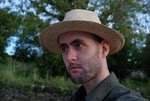
Sylvie took me to a new beach today, near the mouth of the river. The weather was fresh and calm, the sun was pleasing. I realised I hadn't been to another beach, except for my regular haunt, in four years.
Greta was back at school today, but Sylvie and I had one more day's holiday left. 'Let's make the most of it, honey,' Sylvie had said, and made coquettish, seductive eyes at me. That made me smile, but I almost smirked. Sylvie isn't very good at being sexy. She sounds like she's in a bad movie or she's reading lines from a Mills & Boon novel.
When we got to the beach we walked a little way and I plonked myself down in a spot sheltered from the light breeze. Sylvie had brought a rug along and motioned for me to shift onto that, alongside her.
Just the late summer sun and the odd wanderer along the sands for company, Sylvie rolled in towards me for an embrace. I was surprised, but reciprocated. I'm unused to public shows of affection and I had to keep one eye open and trained on the beach ahead, incase of peering nosey walkers.
I rested my left hand on her hip and she tried to pull it up so that it cupped her breast. I resisted and instead settled it lightly on her buttock, which seemed to appease her.
I began to wonder if Anne ever came here with Derek. I guess I had a small panic attack about it, because my breathing increased quite quickly. Sylvie broke away, looked deeply into my eyes and stroked my hair and my face sweetly, I think she thought she'd really quite turned me on. But then the moment was broken by a couple who strolled along the sandbank before us.
"Who's that, is it Anne?" I cried and broke away from Sylvie. Of course it wasn't her and I flushed with childish embarrassment. I looked at Sylvie out of the corner of my eyes and saw her face change from hurt to angry.
She turned away and pretended to sunbathe. We didn't speak again until she unpacked the sandwiches.








